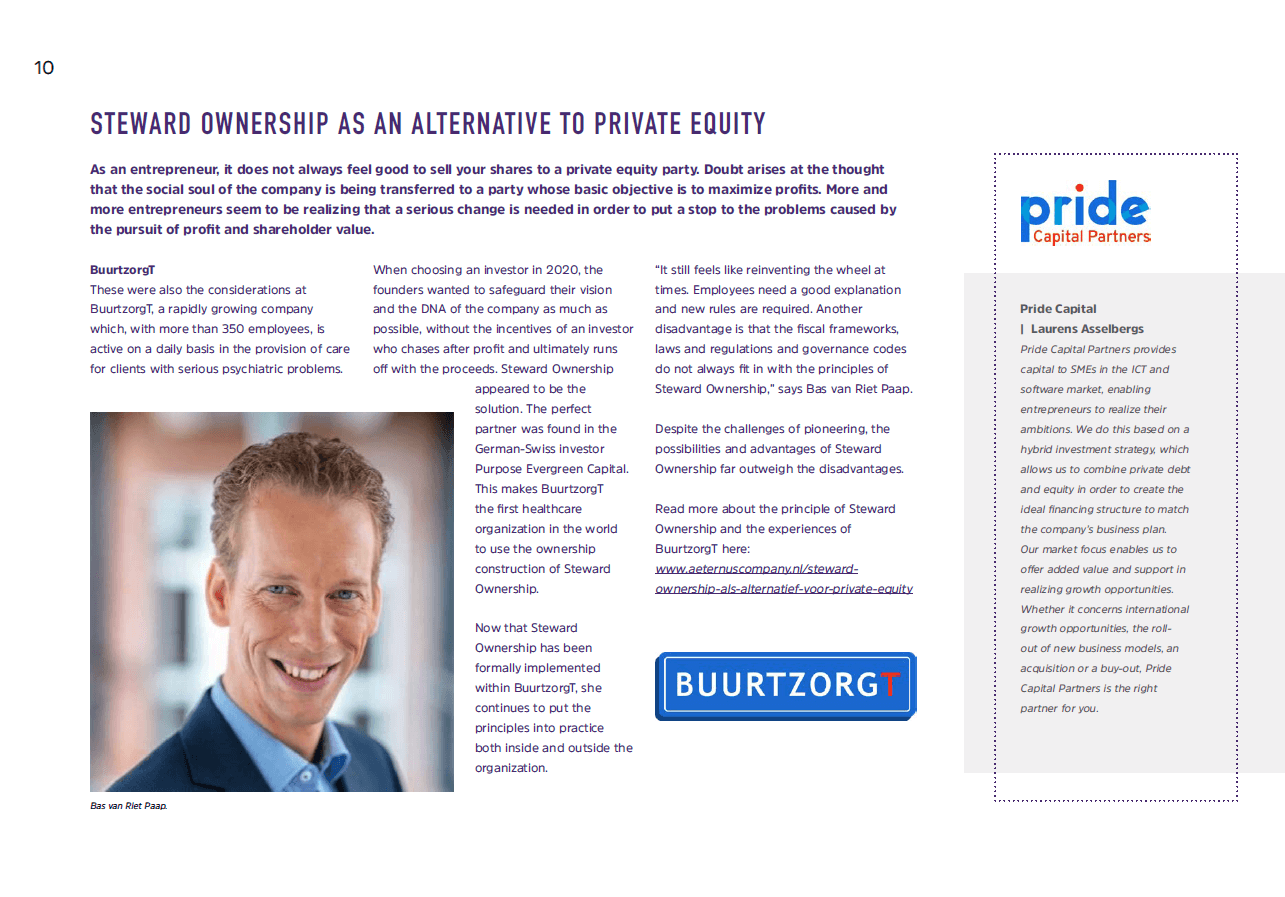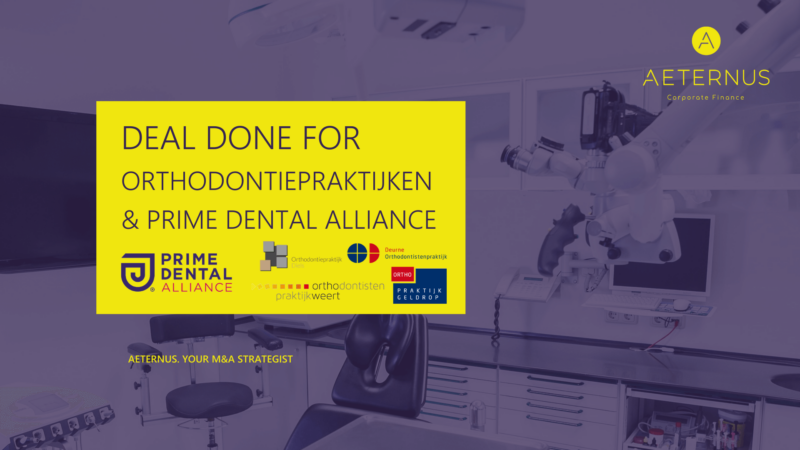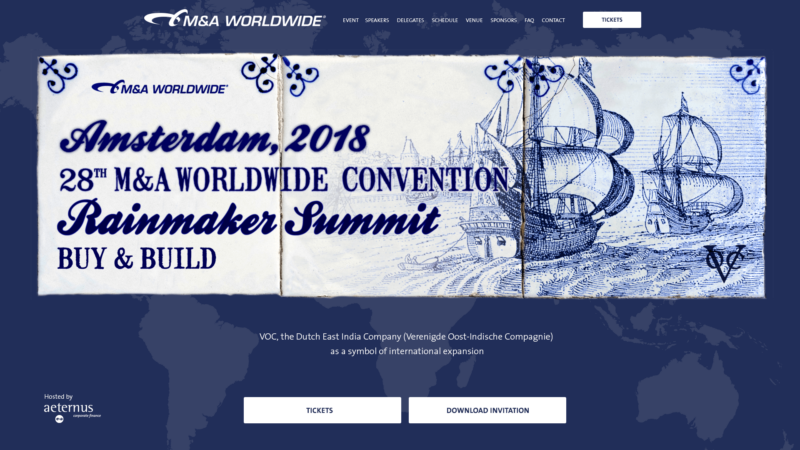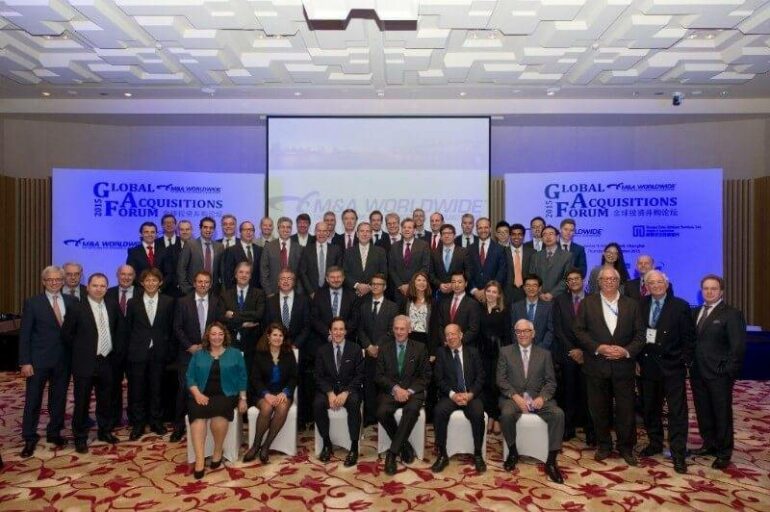Steward Ownership as alternative to Private Equity

In conversation with Bas van Riet Paap
As an entrepreneur, it does not always feel good to sell your shares to a private equity party. Doubt arises at the thought that the social soul of the company is being transferred to a party whose basic objective is to maximize profits. More and more entrepreneurs seem to be realizing that a serious change is needed in order to put a stop to the problems caused by the pursuit of profit and shareholder value.
BuurtzorgT
These were also the considerations at BuurtzorgT, a rapidly growing company which, with more than 350 employees, is active on a daily basis in the provision of care for clients with serious psychiatric problems. When choosing an investor in 2020, the founders wanted to safeguard their vision and the DNA of the company as much as possible, without the incentives of an investor who chases after profit and ultimately runs off with the proceeds. Steward Ownership appeared to be the solution. The perfect partner was found in the German-Swiss investor Purpose Evergreen Capital. This makes BuurtzorgT the first healthcare organization in the world to use the ownership construction of Steward Ownership.
The principle of Steward Ownership
In recent decades, the emphasis for companies and organisations has often been on striving for profit maximisation, in line with the prevailing capitalist economic system. According to many, however, this system loses sight of the negative external effects, such as greenhouse gas emissions, environmental pollution, resource depletion and growing inequality. As a counterweight, governments, citizens, consumers and environmental organisations are increasingly turning to alternatives. Alternatives to the current status quo. One of these alternatives is Steward Ownership.
Splitting ownership and control shares
In principle, Steward Ownership is based on a split between the ‘control shares’ on the one hand and the ‘ownership shares’ on the other.
The controlling shares are held by so-called stewards. These stewards are a representative delegation of the main stakeholders of an organisation as a whole. Stakeholders include staff, customers, suppliers and lenders. These stewards therefore get to call the shots.
The ownership shares, on the other hand, are held by the organisation itself, so that the profit on these ownership shares goes exclusively to the company and its vision. The company therefore owns itself. Profits go, for example, to financing good causes, to building up buffers or to a little extra for the staff in the form of a bonus or a training course.
Profit goes to, for example, financing charities, building up buffers or a little extra for the staff in the form of a bonus or training.
Veto holder
And how do you ensure that the stewards continue to act in line with the organisation’s goals and vision? The Steward Ownership model has a Veto Holder, who holds the Veto Share. This Veto share is a share that ensures that stewards can be overruled on important decisions if they are not in line with the company’s vision.
As an organisation, it is important to clearly define and widely implement Steward Ownership. Which stakeholders will (have to) delegate a steward, how many stewards will be at the table in total, what vision should be followed and who will be the Vetoholder? BuurtzorgT is currently busy implementing these questions with its organisation and within the current legislation and regulations.
The practice of Steward Ownership
For the organisation, Steward Ownership has the important advantage of safeguarding the DNA and vision of the company for the long term. Because the ownership shares are held by the organisation itself, (financial) resources remain where they belong: with the organisation and the stakeholders who do not hold shares with ownership.
Purchase price: founders compensation
But how does the organisation become its own? A selling entrepreneur sells the company to an investor and receives a compensation, also called founders compensation. This founders’ compensation is based on a ‘fair’ selling price, which is a discount on the price that would be realised in the event of a sale to a market player. The company then buys itself back for the same amount within an agreed period of between four and seven years and thus becomes the owner of itself. The investor cannot resell the ownership shares within the agreed period.
In the meantime, the investor receives (only) a market remuneration. It does not seek an additional return on the sale. Strategies aimed at creating so-called exit value, such as an aggressive buy-and-build strategy or a focus on maximising EBITDA, are therefore not pursued.
Control instead of participation
Another important advantage of Steward Ownership is that, through the stewards, real control is created. After all, the stewards are a delegation of the organisation’s stakeholders (e.g. customers, employees, lenders, etc.), and the stewards have a say. In contrast to the current well-intentioned but not very effective structures of, for example, participation councils, Steward Ownership actually achieves the aim of the Care Governance Code. In other words, this can be called ‘next-level’ participation.
Society also benefits
Steward Ownership not only offers advantages to the organisation and the selling entrepreneur, but society as a whole also benefits. Social, ethical and moral standards become part of policy and of the governance code. These are then acted upon instead of pursuing profit.
Companies that are not primarily focused on profit maximisation are more open to minimising the negative external effects of their activities on, for example, nature and the environment. Choosing an environmentally friendly alternative, even though it may be more expensive, suddenly turns out to be the right choice. In addition, part of the profit can be donated to a good cause, for example.
Choosing an environmentally friendly alternative, even though it may be more expensive, suddenly turns out to be the right choice.
A bright future for Steward Ownership
Now that Steward Ownership has been formally implemented within BuurtzorgT, it is increasingly putting the principles into practice both inside and outside the organisation. According to Mr Van Riet Paap of BuurtzorgT, it sometimes feels like reinventing the wheel. For example, employees need a good explanation: what does it mean for them that control is transferred to them and the organisation? And what rules of the game apply? How many stewards are needed and what conditions do they have to fulfil? Is there a fee for this? And how long will the term of office be? Another disadvantage is that the fiscal frameworks, laws and regulations and governance codes do not always fit the principles of Steward Ownership.
Despite the challenges of pioneering, the possibilities and advantages of Steward Ownership far outweigh them. The expectation is that Steward Ownership will gain in popularity. For entrepreneurs who realise that the pursuit of profit must take a different course, who are considering a sale (or are looking for an investor) and who attach great importance to the preservation of vision and DNA, Steward Ownership will increasingly prove to be a good alternative.









